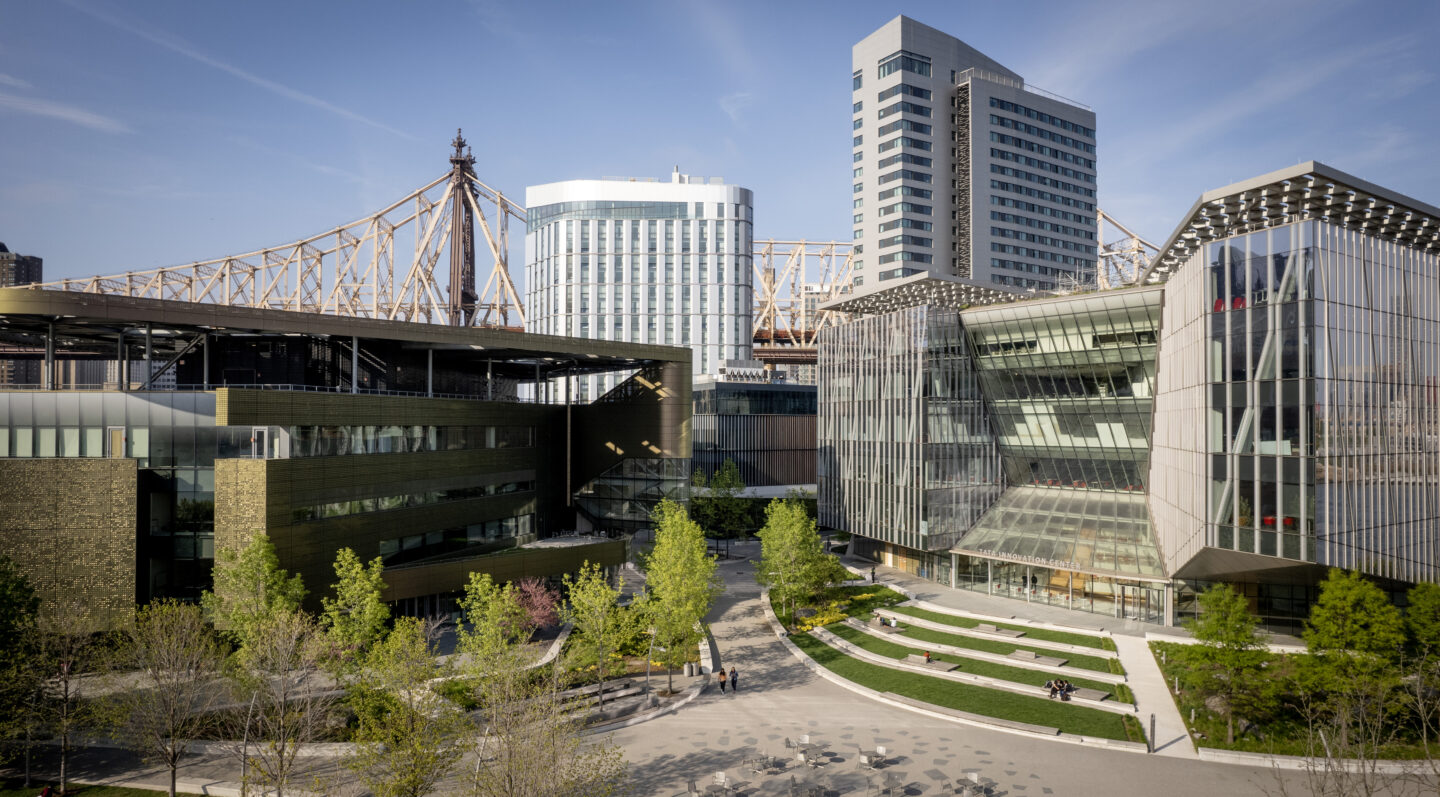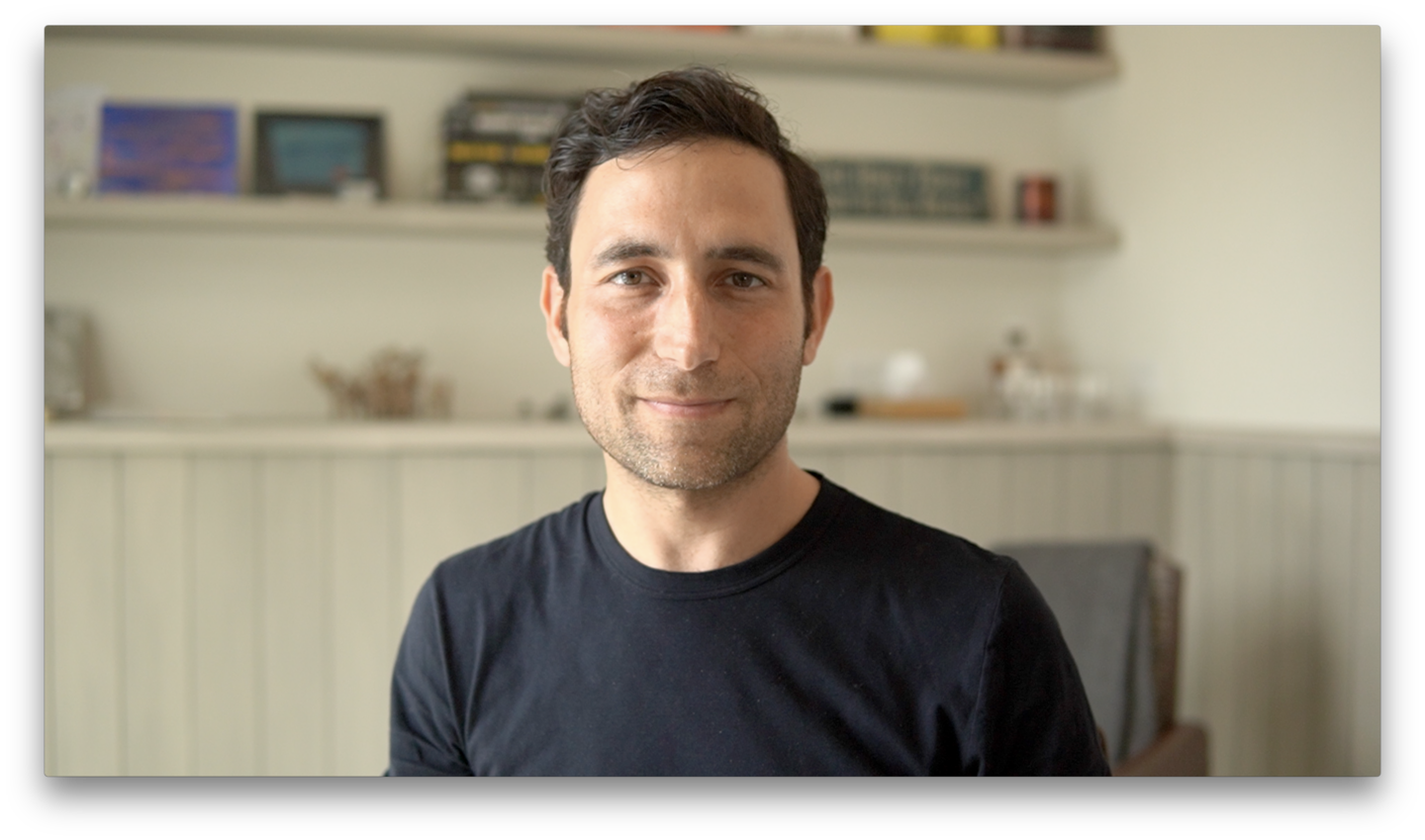Cornell Announces $100M Donation from Bloomberg Philanthropies to Fund Campus Construction
Categories









Former Mayor Michael Bloomberg announces a $100 million gift from Bloomberg Philanthropies for the construction of the first academic building, to be called The Bloomberg Center—in honor of Emma and Georgina Bloomberg.
Mayor Bill de Blasio, former Mayor Michael Bloomberg and Cornell President David J. Skorton tour the Cornell Tech construction site before the event.
Cornell Tech Dean Dan Huttenlocher welcomes guests to the celebration of Cornell Tech campus construction.
Mayor Bill de Blasio speaks about the importance of Cornell Tech to the development of the New York City tech industry.
Invited guests gather at Franklin D. Roosevelt Four Freedoms Park on the southern end of Roosevelt Island, home of the future Cornell Tech campus.
Cornell President David J. Skorton speaks about the mission of Cornell Tech to “reinvent education for the digital age.”
Artist and Cornell alumnus Peter Gerakaris greets guests at “Tropicalia,” his art installation at the RIVAA Gallery on Roosevelt Island running through July 31.
Dean Dan Huttenlocher and Chief Entrepreneurial Officer Greg Pass catch up with recent Cornell Tech graduates after the event.
The first academic building will be named The Bloomberg Center – in honor of Emma and Georgina Bloomberg
The innovative new campus opens summer 2017, combining academia and industry to launch new companies and products. Campus will feature The Bridge, industry’s home on campus & first Passive House high rise in the world
NEW YORK CITY – Cornell University President David J. Skorton, Cornell University Board Chair Robert S. Harrison, Cornell Tech Dean Daniel P. Huttenlocher, New York State Lt. Governor Kathleen Hochul, Mayor Bill de Blasio, New York City Council Speaker Melissa Mark-Viverito, former Mayor Michael R. Bloomberg, Forest City Ratner Companies President and CEO MaryAnne Gilmartin, and The Hudson Companies Principal David Kramer today celebrated the groundbreaking of Cornell Tech’s campus on Roosevelt Island and announced a $100 million gift from Bloomberg Philanthropies to fund construction of the campus. The first academic building on the campus will be named The Bloomberg Center – in honor of Emma and Georgina Bloomberg. Cornell Tech is a revolutionary model for graduate tech education, developing pioneering leaders and technologies for the digital age. Three years ago, Cornell and its academic partner, the Technion – Israel Institute of Technology won New York City’s competition – led by former Deputy Mayor Robert K. Steel – to build an applied sciences institution in partnership with the City. Today’s groundbreaking and the announcement of the generous donation mark a major milestone in this effort, with the first phase of the campus due to open in the summer of 2017.
Cornell Tech began classes in January 2013 at its temporary campus in space donated by Google in their Chelsea building. There are currently approximately 15 world-class faculty members, an additional 15 research and development staff, two dozen Ph.D. students in several disciplines, and four master’s programs: the MEng in computer science; the Johnson Cornell Tech MBA; the dual degree Connective Media program at the Jacobs Technion-Cornell Institute, the academic partnership between Cornell and the Technion; and starting this fall at the Jacobs Institute, Healthier Life, which will bridge the gap between healthcare and technology. The majority of Cornell Tech’s nearly 100 alumni are pursuing their own startups and working at companies in New York City.
“Cornell Tech isn’t just one of the world’s leading research institutions – it’s a pioneering model for using tech to solve real-world problems, and an economic game-changer that will drive smart, powerful, and equitable growth in New York City for generations,” said Mayor Bill de Blasio. “The new Roosevelt Island campus will bring together academia and industry in the service of invention and innovation – and the result will be hundreds of homegrown companies that provide a pathway to opportunity for thousands of New Yorkers. We look forward to continued partnership with Cornell Tech, and commend Mayor Bloomberg’s commitment to this effort, and to this groundbreaking institution.”
“We are so grateful for the generosity of Bloomberg Philanthropies. This gift holds special meaning because Mayor Bloomberg first envisioned the Applied Sciences initiative and has seen this project through since its inception in 2011,” said Cornell University President David J. Skorton. “At Cornell Tech we are creating a high-tech entrepreneurial hub for the benefit of the city, the state and the world, and I want to thank Governor Cuomo, Mayor Bloomberg, Mayor de Blasio and many others for their trust, vision and partnership as we work to reinvent graduate education for the digital age and build a pipeline of tech talent right here in New York.”
“New York became the greatest city in the world because we dared to dream bigger than anyone else, and this project – and the challenge it represents to Silicon Valley – are part of that tradition,” said Michael R. Bloomberg. “After talking with leaders from every industry, we launched a competition to bring an applied science campus here, to help lay an economic foundation for the next century — creating jobs and opportunity for New Yorkers on every rung of the economic ladder. I believe in the importance of this public-private partnership to our city’s future, and it’s why the contribution is in honor of my daughters, as there is no better gift I can leave them than to help make the world — and their hometown — a better place. This is a gift to support a brighter future for our city and for every young person who grows up here or comes here with a dream, like I did.”
“Cornell Tech has come so far in just over three years, with new degree programs, faculty, 100 graduates and our developing campus on Roosevelt Island. We are extremely grateful to all of our partners in this effort, including the NYC tech community, the City, Roosevelt Islanders and many more who are helping us bring our vision to life,” said Cornell Tech Dean Daniel Huttenlocher.
“This is a historic day for Cornell University and for New York City. Cornell has had an unwavering commitment to innovation over its rich history, and Cornell Tech is a prime example of that. We are achieving something revolutionary here, and this very generous gift from Bloomberg Philanthropies is symbolic of our shared values and dedication to the future,” said Robert S. Harrison, Cornell University Board Chair.
“Cornell Tech, which is the home of the Joan and Irwin Jacobs Technion-Cornell Institute, will be one of the most fascinating campuses ever built. It is extremely gratifying to know that the Technion is part of it. It will be one of the most modern and advanced research institutes in the world — a citadel of innovation. When I visited Roosevelt Island recently, I felt that I was standing on a bridge between the Technion and Cornell University. I think everyone in Israel and New York should be proud of what has been accomplished here. I congratulate Mayor Michael Bloomberg for his vision and for his extraordinary gift that will help make this vision a reality,” said Technion President Peretz Lavie.
“New York City is a global hub for innovation and there is no better home for Cornell Tech’s new state-of-the-art campus than right here in the tech capital of the world. From its unique fusion of technology, art, open space and community to its commitment to sustainability and energy conservation, the Cornell Tech Roosevelt Island Campus represents the new frontier in education for the next generation of leaders and problem-solvers. The New York City Council is proud to welcome Cornell Tech to New York City and looks forward to its great success,” said New York City Council Speaker Melissa Mark-Viverito.
To commemorate the groundbreaking, Cornell Tech commissioned Cornell University alumnus Peter Gerakaris to create a site-specific installation at the RIVAA Gallery on Roosevelt Island. The exhibition opens today and represents the university’s presence by fusing art, technology, place and community. The sprawling 1,000-square-foot installation of kaleidoscopic imagery engages the public in visual play as new layers, patterns, and connections are revealed with each viewing. The exhibit is supported by a generous gift from the Eisenberg Family.
The first phase of Cornell Tech’s campus includes:
The Bloomberg Center, designed by Pritzker Prize-winning architect Thom Mayne of Morphosis Architects. The building is a departure from traditional academic facilities with an open plan and extensive collaborative as well as private work spaces, adapting open plan offices from the tech world to the academic arena. Cornell is aspiring for the building to be among the largest net-zero energy buildings in the United States, with all of its power generated on campus.
The Bridge at Cornell Tech, designed by WEISS/MANFREDI and developed by Forest City Ratner Companies, will be a first-of-its-kind building that will house an ecosystem of companies, researchers and entrepreneurs who are focused on catalyzing innovation and the commercialization of new products and technologies, driving economic growth for New York.
“The Bridge at Cornell Tech is a place for companies looking to test and launch products and ideas, a place where research comes to life and technology meets the market,” said MaryAnne Gilmartin, President and CEO of Forest City Ratner Companies. “For the right companies committed to innovation and collaboration, The Bridge will provide a massive competitive advantage at the center of the campus and the heart of New York City.”
A residential building, designed by Handel Architects and developed by Hudson and Related Companies, that will be the first Passive House high-rise in the world. Passive House is the strict international building standard that drastically reduces energy consumption while creating a healthier and more comfortable living environment for a fraction of residents’ usual energy costs. The residential building will be for faculty, staff and students to ensure the campus is active 24/7.
“We have spent the past 2 years working with an incredible team of engineers and designers to establish this new standard for a 26 story building,” said David Kramer, Principal of the Hudson Companies. “We hope that this boundary-pushing development will serve as a living lab and enduring inspiration to the community of next-generation problem solvers who will live within its (well insulated) walls.”
The first phase of the campus will open summer 2017. When fully completed, the campus will span 12 acres on Roosevelt Island and house approximately 2,000 students and hundreds of faculty and staff. The campus master plan was designed by Skidmore, Owings & Merrill with James Corner Field Operations, and includes a number of innovative features and facilities across a river-to-river campus with expansive views, a series of green, public spaces, and a seamless integration of indoor and outdoor areas. The campus will be one of the most environmentally friendly and energy-efficient campuses in the world.
In May, 73 master’s students in computer science and business and 2 PhD students graduated from Cornell Tech, and more than half stayed in New York for job opportunities and to pursue their own startups. Almost one-third of the graduates are pursuing their own ventures that were developed on campus, including the winners of Cornell Tech’s first-ever Startup Awards. Through the awards, five groups of students are now working full-time on the companies they built during their academic program with pre-seed funding from the Blackstone Foundation and free co-working space at Forest City Ratner’s New York Times building.
Cornell Tech was founded when it was selected in December of 2011 as the winner of the New York City Economic Development Corporation’s Applied Sciences NYC initiative. The Economic Development Corporation, then led by Executive Director Seth Pinsky, sought proposals for a university to develop and operate a new or expanded campus in the City in exchange for City capital, access to City-owned land – and the full support and partnership of City government. Cornell’s proposal was selected ahead of submissions from 17 world-class institutions from around the globe. The Cornell and Technion partnership was selected by the City as the first winner of the competition and was provided with land on Roosevelt Island and $100 million in City capital to build the $2 billion, 2 million square foot tech campus.
Cornell Tech is already fulfilling its promise to New York City to spur tech education in New York City public schools. Cornell Tech has partnered with more than a dozen local schools, including PS/IS 217 on Roosevelt Island, and is coordinating professional development opportunities for teachers to gain experience in incorporating tech thinking into their teaching.
Cornell Tech
Cornell Tech develops pioneering leaders and technologies for the digital age. Cornell Tech brings together faculty, business leaders, tech entrepreneurs, and students in a catalytic environment to produce visionary results grounded in significant needs that will reinvent the way we live in the digital age. Cornell Tech’s temporary campus has been up and running at Google’s Chelsea building since 2012, with a growing world-class faculty, and about 150 master’s and Ph.D. students who collaborate extensively with tech-oriented companies and organizations and pursue their own startups. Construction is underway on Cornell Tech’s campus on Roosevelt Island, with a first phase due to open in 2017. When fully completed, the campus will include 2 million square feet of state-of- the-art buildings, over 2 acres of open space, and will be home to more than 2,000 graduate students and hundreds of faculty and staff.
Media Coverage:
Business Insider
CBS New York
Crain’s
Forbes
Newsday
The New York Times
NY 1
Wall Street Journal





